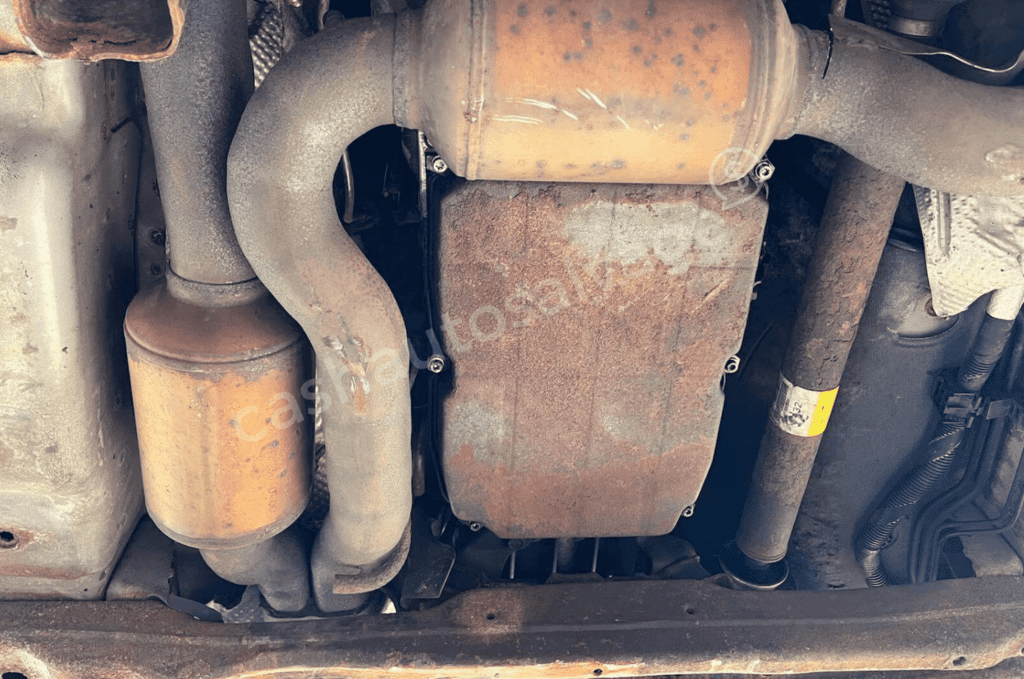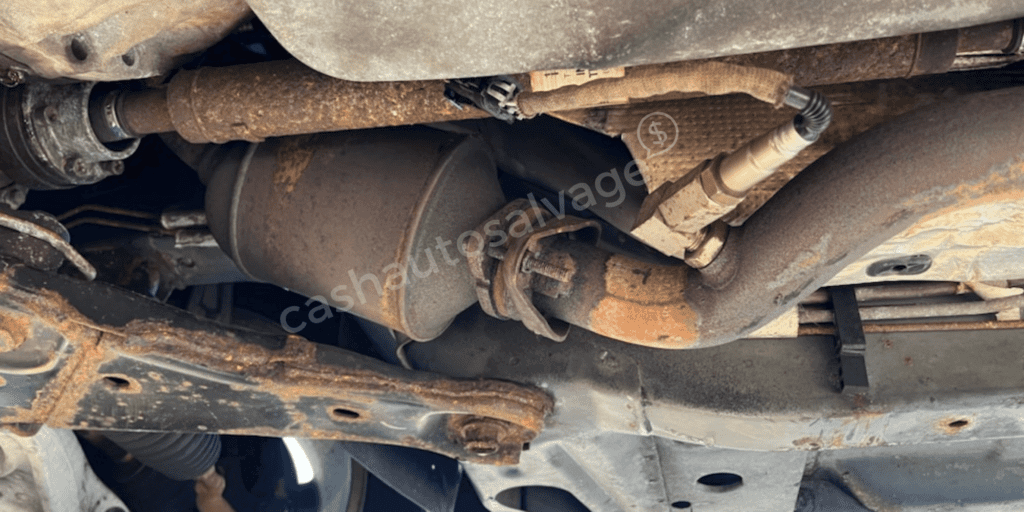Selling junk vehicles is a process that usually starts with a phone call or an online inquiry. After determining that the vehicle is, in fact, junk and not just in need of a few repairs, the next question is always, “how much will you give me for it?”
The answer to that question depends on several factors, but one of the most important is the presence (or absence) of a catalytic converter.
Why are catalytic converters so important? And, perhaps more importantly, how can their presence (or absence) affect the price you’re offered for your junk car? In this article, we’ll answer those questions and more.
What Is a Catalytic Converter?
A catalytic converter is a device that’s fitted to the exhaust system of most modern vehicles. Its purpose is to convert harmful pollutants in engine exhaust gas into less harmful substances before they’re released into the atmosphere.
In other words, catalytic converters help to keep the air we breathe clean. For that reason, they’re required by law in most countries around the world, including the United States.
Watch the video below and read the rest of this article to see how catalytic converters affect junk car prices.
How Do Catalytic Converters Work?
Catalytic converters work by using a chemical reaction to convert three harmful pollutants in engine exhaust gas into less harmful substances. These pollutants are:
- Carbon monoxide (CO)
- Hydrocarbons (HC)
- Nitrogen oxides (NOx)
The catalytic converter contains a honeycombed ceramic structure that’s coated with a metal catalyst, usually platinum or palladium. When exhaust gas passes through the converter, the catalyst causes a chemical reaction that converts the pollutants into less harmful substances.
- Carbon monoxide is converted into carbon dioxide (CO2)
- Hydrocarbons are converted into water vapor and carbon dioxide (CO2)
- Nitrogen oxides are converted into nitrogen and oxygen (N2 and O2)
Precious metals like platinum and palladium are used because they have a high affinity for catalyzing these reactions. They’re also extremely durable, which means they can withstand the high temperatures that are present in the engine exhaust gas.
In today’s cars, catalytic converters are fitted to the exhaust system after the engine and before the muffler. They can be fitted to the exhaust manifold (the pipe that connects the cylinder head to the rest of the exhaust system), or they can be fitted downstream from the manifold in what’s known as a “close-coupled” configuration.
Types of Catalytic Converters
There are three main types of catalytic converters:
- Two-way catalytic converters
- Three-way catalytic converters
- Diesel oxidation catalysts
Two-way catalytic converters are the most common type of converter. They’re fitted to the exhaust systems of gasoline-powered vehicles and they’re designed to convert carbon monoxide and hydrocarbons into carbon dioxide and water vapor.

Three-way catalytic converters are fitted to the exhaust systems of gasoline-powered vehicles and they’re designed to convert carbon monoxide, hydrocarbons, and nitrogen oxides into carbon dioxide, nitrogen, and water vapor.
Diesel oxidation catalysts are fitted to the exhaust systems of diesel-powered vehicles and they’re designed to convert carbon monoxide and hydrocarbons into carbon dioxide and water vapor.
These three types of catalytic converters all work in basically the same way, but they’re designed to deal with different types and amounts of pollutants.
History of the Catalytic Converter
The catalytic converter was invented in the 1950s by Eugene Houdry, a French-born engineer who moved to the United States in 1930. Houdry was working on ways to reduce air pollution from automobiles, and he came up with the idea of using a catalytic converter to convert harmful pollutants into less harmful substances.
Houdry’s catalytic converter was first used on a large scale in 1975 when the U.S. government passed a law requiring catalytic converters to be fitted to all new cars and trucks. Since then, catalytic converters have become standard equipment on most vehicles around the world.
Catalytic Converter Theft
Catalytic converters are often stolen from cars and trucks because they contain precious metals like platinum and palladium. The catalytic converter can be removed from a vehicle in a matter of minutes, and it can be sold for scrap metal for a few hundred dollars.
Theft of catalytic converters is a serious problem in many countries, and it’s often difficult for the police to catch the thieves. In some cases, the catalytic converter can be covered with a metal cage or security device to prevent it from being stolen.
Incidences of catalytic converter theft have been on the rise in recent years, and it’s becoming a major problem for car owners. If you have a catalytic converter fitted to your vehicle, it’s important to be aware of the risk of theft and take steps to protect your property.
In some countries, catalytic converter theft has become so common that insurance companies are now offering special coverage to protect against it.
How Catalytic Converters Affect Junk Car Prices
Now, we know that catalytic converters can affect the value of your junk car because they contain metals that can be recycled. But did you know that catalytic converters can also affect the offer you receive for your junk car? Here’s how:
If your catalytic converter is missing or damaged, it will likely lower the offer you receive for your junk car. This is because catalytic converters can be pretty expensive to replace. The cost of a catalytic converter can range anywhere from $800 to $1,200. So, if your catalytic converter is missing or damaged, it’s likely that the salvage yard will offer you a lower price for your junk car.
On the other hand, if you have a catalytic converter that is in good condition, you may be able to get a higher offer for your junk car. This is because catalytic converters contain metals that can be recycled. So, if you have a catalytic converter that is in good condition, the salvage yard may offer you a higher price for your junk car.
Important to note: if your catalytic converter isn’t an original (meaning, you have replaced it), there’s a good chance that this can lower any offer that you receive when selling a junk vehicle.
What’s Inside a Catalytic Converter?
Catalytic converters are made up of three main parts: the housing, the catalytic converter itself, and the substrate.
The housing is typically made of stainless steel or aluminum. The catalytic converter is made up of a honeycomb-shaped substrate that is coated with platinum, palladium, and rhodium. The substrate is what catalyzes the reaction that converts harmful emissions into harmless gases. The catalytic converter also has a washcoat, which is a layer of material that helps to keep the catalytic converter clean.
These primary metals —platinum, palladium, and rhodium—are what make catalytic converters so valuable. As of this year, the average price of platinum has increased to $1,021 per ounce, while palladium has increased to $2,049 per ounce. Rhodium, on the other hand, is not traded on exchanges and its price is not publicly available. However, experts estimate that the price of rhodium could be as high as $15,500 per ounce!
This is why catalytic converters can have such a big effect on junk car prices. If you have a catalytic converter that is in good condition, you may be able to get a higher offer for your junk car. However, if your catalytic converter is missing or damaged, it will likely lower the offer you receive for your junk car.
How to Find Your Catalytic Converter
If you’re not sure where your catalytic converter is located, don’t worry! We’ve got you covered.
The catalytic converter is located under the car, between the engine and the muffler. It’s typically a cylindrical shape and it’s usually made of stainless steel or aluminum.

If you can’t find your catalytic converter, or if it’s missing or damaged, you can always contact a salvage yard and ask for a quote. Most salvage yards will be able to give you an estimate over the phone.
The Cost To Fix a Catalytic Converter
The cost of repairing a catalytic converter can vary depending on the damage. However, the average cost is around $950 to $2,500.
If the catalytic converter is damaged, it will need to be repaired or replaced. If the honeycomb is damaged, the entire catalytic converter must be replaced.
If you’re unsure whether your catalytic converter needs to be repaired or replaced, you can take it to a local mechanic for inspection. They will be able to tell you if it’s necessary to repair or replace your catalytic converter and how much it will cost.
If your catalytic converter is damaged, be prepared to pay at least $1,000 to get it fixed. However, if you’re able to get your catalytic converter repaired through a recycling program at a salvage yard, it could save you money in the long run. With this information in mind, you can decide whether to repair or replace your catalytic converter before you sell your junk car.
Factors That Can Affect the Cost of Catalytic Converter Repairs
Several factors can affect the cost of catalytic converter repairs:
- The damage to the catalytic converter: The damage to your catalytic converter will significantly impact the cost of repairs. For example, if it’s missing or damaged in multiple places, it may require replacing the catalytic converter entirely and can be costly.
- The type of catalytic converter being repaired: The catalytic converter being repaired can also impact the cost, as some catalytic converters are more challenging to replace or repair than others. If you have a rare or very old catalytic converter that is difficult to find or replace, it may be more expensive to fix.
- Whether a warranty covers your catalytic converter repairs: If you have a catalytic converter covered by a catalytic converter warranty, this may help lower the cost of repairs. However, if you don’t have a catalytic converter warranty, you must be prepared for the higher costs associated with catalytic converter repairs.
- The cost of parts and labor for catalytic converter repairs: The cost of catalytic converter repairs will also depend on the cost of parts and labor. For example, if catalytic converter parts are more expensive or you need a mechanic to do the work, this can increase the overall cost of repairs.
- Whether you choose to hire a mechanic or perform the repairs yourself: Finally, whether you hire a mechanic or do the catalytic converter repairs can impact the overall cost. If you decide to perform the catalytic converter repairs yourself, you may be able to save some money on labor costs.
The Cost To Replace a Catalytic Converter
On average, catalytic converter replacements cost around $1,500 to $1,800, depending on the make and model of your car. However, catalytic converter replacements can be more or less expensive depending on several factors, including the type of product you purchase, where you get it installed, and how much labor is involved in replacing it.
One of the most critical factors affecting catalytic converter replacement cost is your purchase type. There are two main types of catalytic converters: catalyzed and uncatalyzed. Catalyzed catalytic converters are more expensive than uncatalyzed ones, as they use precious metals such as platinum, palladium, and rhodium to catalyze the converter.
Another critical factor affecting catalytic converter replacement cost is where you get your catalytic converter replaced. If you take your car to a dealership or an auto repair shop specializing in catalytic converter replacement, expect to pay more than if you go to a general repair shop. However, wherever you choose to go, make sure they use high-quality products and have extensive experience working with catalytic converters.
Finally, the catalytic converter replacement cost can also depend on how much labor is involved in replacing your catalytic converter. Suppose the technician installing your catalytic converter needs to cut into your car’s exhaust or remove other parts to access the catalytic converter. In that case, you can expect to pay more than if they can pull the catalytic converter out.
How To Know the Price Of a Catalytic Converter
The price of a catalytic converter can vary depending on a few factors.
The first factor is the size of the catalytic converter. Catalytic converters come in different sizes, so the price will vary depending on the size of the catalytic converter.
The second factor is the type of catalytic converter. As we have mentioned earlier there are three types, two-way, three-way, and diesel catalytic converters. The price will vary depending on the type of catalytic converter.
The last factor is the condition of the catalytic converter. If the catalytic converter is in good condition, you may be able to get a higher offer for your junk car. However, if your catalytic converter is missing or damaged, you will likely get a lower offer for your junk car.
This is why it’s important to know the condition of your catalytic converter before you sell your junk car.
Tips For Selling Your Junk Car
Now that you know how catalytic converters can affect the price of your junk car, here are some tips to get the most money for your junk car:
Make Sure the Catalytic Converter Is Attached
If your catalytic converter is missing or detached, it will likely lower the offer you receive for your junk car. So, if you’re planning on selling your junk car, make sure the catalytic converter is attached. If it’s not, salvage yards may be able to help you attach it or they may give you a lower offer for your junk car.
Know the Condition of Your Catalytic Converter
As we mentioned earlier, the condition of your catalytic converter can have a big effect on the price you receive for your junk car. So, before you sell your junk car, make sure you know the condition of your catalytic converter.
If it’s in good condition, you may be able to get a higher offer for your junk car. However, if it’s missing or damaged, you will likely get a lower offer.
Don’t Remove the Honeycomb From the Shell
The honeycomb is the part of the catalytic converter that contains the precious metals. So, if you remove the honeycomb from the shell, you will likely get a lower offer for your junk car.
Salvage yards typically pay by the pound, so if you remove the honeycomb, you will be paid less for your junk car.
Make Sure the Shell of the Catalytic Converter Is Intact
The shell of the catalytic converter is important because it protects the honeycomb inside. The honeycomb is made of ceramic and contains platinum, palladium, and rhodium. These precious metals act as a catalyst, meaning they help the catalytic converter do its job. When the catalytic converter shell is damaged, it can’t protect the honeycomb as well as it should. This makes the catalytic converter less effective, which can reduce the offer on your junk car.
Contact More Than One Salvage Yard
When you’re ready to sell your junk car, it’s a good idea to contact more than one salvage yard. This way, you can compare offers and get the best price for your junk car. If the prices are much lower than you expected, that could be a warning sign that the salvage yard is trying to take advantage of you or that they don’t know the true value of catalytic converters.
Ask About Recycling Programs
Some salvage yards offer recycling programs for catalytic converters. These recycling programs allow you to get paid for your catalytic converter even if it’s damaged.
If you’re planning on selling your junk car, make sure to ask about recycling programs. You may be able to get paid for your catalytic converter even if it’s damaged.
Final Thoughts
As you can see, catalytic converters can have a big effect on the price of your junk car. So, before you sell your junk car, make sure you know the condition of your catalytic converter and make sure it’s attached. If your catalytic converter is missing or detached, you will likely get a lower offer for your junk car.
If you have any questions about catalytic converters or how they affect the price of your junk car, contact a local salvage yard. They will be able to help you out and give you more tips on how to get the most money for your junk car.
Want to get an instant offer on your vehicle, fill out our online form by clicking here.



